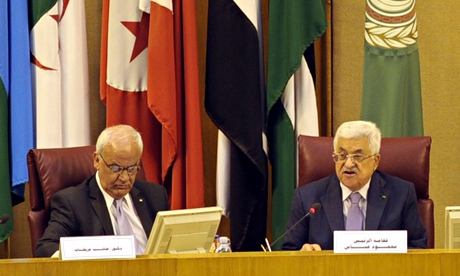Palestinian president presses for UN vote on Israeli withdrawal
Palestinian president presses for UN vote on Israeli withdrawal
Mahmoud Abbas pushes for Wednesday vote as Netanyahu files to Rome to meet US secretary of state John Kerry

The Palestinian president, Mahmoud Abbas, is pushing for a vote in the United Nations security council – as early as Wednesday – on a resolution calling for a deadline to end the 47-year-long Israeli occupation.
The move, disclosed late on Sunday night by the chief Palestinian negotiator, Saeb Erekat, comes as Israel’s prime minister vowed to reject any attempt to set a deadline for the establishment of a Palestinian state based on 1967 borders or a timeline for ending the occupation.
Binyamin Netanyahu’s comments came as he flew to Rome for a meeting with the US secretary of state, John Kerry, to discuss Palestinian moves at the UN. Kerry will later meet with Arab foreign ministers and Erekat in London.
The push to hold a vote on Wednesday comes during a period of intense diplomatic negotiations over two rival draft texts for a resolution. The first, sponsored by Jordan at the behest of the Palestinians – envisages setting a November 2016 deadline for ending the occupation. The rival proposal, drawn up by France, would only set a deadline for an end to negotiations between Israelis and Palestinians.
Kerry’s sudden involvement in talks around the resolution is being seen as an attempt to manage a process the US fears could raise already high tensions and in which according to one quoted official it sees only “bad scenarios”.
The French draft – which has been drawn up with input from the UK and Germany – speaks of the 1967 borders as the basis for dividing the land, which President Barack Obama has publicly backed, but it does not include key Israeli and US conditions such as Palestinian recognition of Israel as a Jewish state.
A senior western diplomat said the Europeans – led by France – were aiming for a consensus resolution devising a binding, unspecified, timeframe and felt the Americans were open to the possibility.
“There is a window of opportunity now, there is a willingness from them to consider ... options at the security council,” the diplomat said.
However, the French proposal is seen by Palestinians as falling far short of their demands. “It has killed substance of our resolution,” one senior official with intimate knowledge of the negotiations told the Guardian.
“The French are talking about a timeframe for a conclusion of peace talks. We are talking about ending occupation. And so far the Americans have committed a serious mistake. They have failed to engage with the resolution despite being invited to.”
The increased diplomatic manoeuvring comes amid concerns among some western countries that the security council will need to be seen to take concrete action on the the Middle East peace process – which collapsed in the spring amid mutual recriminations – to avoid a downward spiral between Palestinians and Israelis turning into a more serious confrontation.
The timing of any vote is regarded as crucial.
Palestinian negotiators have been seeking at least nine votes in support on the security council that many believe they will find easier to muster in January when three states without diplomatic relations with Israel join the council’s rotating membership.
While Palestinian officials expect the US to veto any resolution – despite US claims that they have yet to decide how to vote – officials around Palestinian president Mahmoud Abbas are divided over when that likely veto should be prompted.
A vote attracting majority support on the security council – even one attracting a US veto – would be seen by Palestinians as exposing the fact that the US “is not an honest broker” in the peace process, opening the way to pressure for an international conference on the issue.
It would also be seen as strengthening any future Palestinian move to join the international criminal court, which it has long been threatening to do.
Complicating the issue are several factors, not least the fact that Israel is at the beginning of a prolonged election campaign that diplomats believe will lead to a hardening of Netanyahu’s position.
Speaking ahead of his trip to meet Kerry in Rome, Netanyahu said: “We will not accept attempts to impose unilateral measures upon us by a set date, at a time when radical Islam is spreading throughout the world.”
While the US has long opposed the idea of the security council imposing a framework for Israeli-Palestinian negotiations, the increasing internationalisation – in which several European countries have taken symbolic votes recognising a Palestinian state – of the issue has pushed some to speculate that the Washington is more open to engaging in talks about security council intervention.
For Washington, too, simply vetoing the plan could be seen as more difficult than in the past.
A veto would upset Palestinians and perhaps some Arab allies frustrated by years of diplomatic gridlock. Several are fighting alongside the US against the Islamic State.


تعليقات